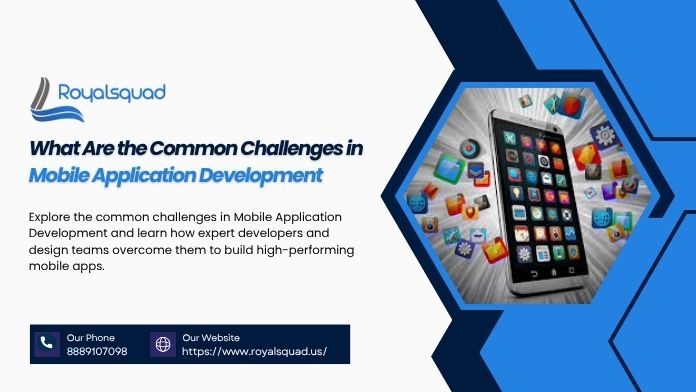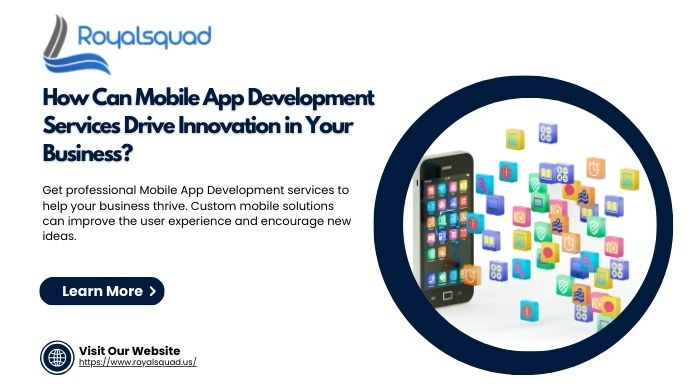
What Are the Common Challenges in Mobile Application Development?
Introduction
The need for mobile apps has expanded quickly across all industries, changing how companies communicate with clients and provide services. Every industry uses apps extensively to improve user experience and engagement, from e-commerce and education to healthcare and entertainment. But creating mobile applications is more difficult than it first appears. It entails a number of intricate procedures, technical choices, and creative processes that can pose a number of difficulties for both developers and companies.
Developing effective, high-performing, and user-friendly mobile apps requires an understanding of these challenges. Whether you’re working with a mobile application development firm or managing an in-house team, addressing these issues early can save time, reduce costs, and ensure successful project delivery.
1. Choosing the Right Platform
Choosing which platform to target—Android, iOS, or both—is one of the most difficult challenges in developing mobile applications. Every platform has its own design rules, languages, and development tools.
Developers frequently debate whether to choose cross-platform solutions that save time and money or native mobile phone application development, which guarantees greater performance and deeper system integration. Before deciding on a platform approach, businesses must carefully consider their budget, device preferences, and audience demographics.
Based on the objectives of your project and the behavior of your target audience, a skilled mobile application development company may assist in assessing these variables and suggesting the optimal platform strategy.
2. Managing Device Fragmentation
A further major obstacle in the development of mobile applications is device fragmentation. Thousands of devices with varying screen sizes, resolutions, operating systems, and hardware capabilities may be found in the mobile market.
For instance, Android developers have to make sure their software functions properly across a variety of tablets and smartphones. Testing is more difficult and time-consuming due to the variety of devices.
An expert mobile application development company checks app compatibility across various devices using automated testing tools and emulators. This guarantees that, regardless of the device, the app provides flawless user experience and stable performance.
3. Delivering High-Quality User Experience
Any mobile app's user experience (UX) is essential to its success. If an application is not user-friendly or aesthetically pleasing, even the most feature-rich one may fail. User research and UI/UX design services are needed to create a design that is easy to use, interesting, and accessible.
Developers must guarantee responsive layouts, quick loading times, and easy navigation while creating mobile applications. To improve the overall design, a seasoned mobile application development company incorporates feedback loops and usability testing. To match functionality and aesthetics, design and development teams must work together.
4. Ensuring Security and Data Privacy
Data security is a major concern in today's digital environment. Sensitive user data, including passwords, payment details, and personal information, is frequently stored and transmitted by mobile apps. Strong encryption, secure APIs, and frequent vulnerability assessments are necessary to guarantee the protection of sensitive data while developing mobile applications.
Depending on the app's intended user base, developers must additionally abide with local data protection regulations like GDPR and HIPAA. When developing mobile applications, disregarding security can lead to data breaches, a decline in user confidence, and legal repercussions.
5. Balancing Performance and Features
Another major issue in the creation of mobile applications is performance optimization. Users anticipate fast app launches, instantaneous responses, and little battery and data consumption. However, the program may become slower and need more resources if more features are added.
Mobile application development teams must concentrate on developing clear, efficient code and utilizing lightweight frameworks in order to strike the ideal balance. Frequent testing and performance audits guarantee that the application operates without latency or crashes on all devices.
6. Integration with Existing Systems
Many companies require their mobile apps to interface with pre-existing software systems, such as e-commerce platforms, CRM, and ERP. This procedure can get complicated, particularly when working with third-party APIs or historical systems.
While preserving data integrity and synchronization, a reputable mobile application development company guarantees smooth integration between the application and backend systems. For integration to be successful, cooperation between mobile developers and web development services is frequently essential.
7. Testing Across Environments
One of the most time-consuming stages of developing a mobile application is testing. To find bugs and performance problems, apps must be tested on a variety of devices, operating systems, and network speeds.
Unit tests, integration tests, usability tests, and beta testing are all part of comprehensive testing. Negative reviews, software crashes, and low user retention can result from skipping this step. Cloud-based testing solutions are used by many mobile application development companies to expedite the process and guarantee quicker quality assurance.
8. Keeping Up with Rapid Technological Changes
One of the most time-consuming stages of developing a mobile application is testing. To find bugs and performance problems, apps must be tested on a variety of devices, operating systems, and network speeds.
Unit tests, integration tests, usability tests, and beta testing are all part of comprehensive testing. Negative reviews, software crashes, and low user retention can result from skipping this step. Cloud-based testing solutions are used by many mobile application development companies to expedite the process and guarantee quicker quality assurance.
9. Handling App Store Guidelines and Approvals
Strict adherence to their rules and design guidelines is necessary when submitting an app to stores like the Google Play Store or Apple App Store. Applications that don't follow these rules risk being denied, which would postpone the debut.
An expert mobile application development company is aware of these submission procedures and makes sure that store policies are followed from the start. This shortens the time to market and lowers the chance of rejection.
10. Post-Launch Maintenance and Updates
After the app launches, the work doesn't stop. Maintaining the app's security and relevance requires regular upgrades, maintenance, and user feedback management.
Planning for long-term support throughout the development of a mobile application ensures that it changes in tandem with user demands and technological advancements. Regular updates add new features that keep users interested in addition to fixing faults.
11. Budget Constraints
One of the most prevalent business issues in the creation of mobile applications is budget management. Additional functionality, prolonged testing, or third-party integrations may result in higher costs.
Clearly defining project needs and collaborating with an open mobile application development company that offers thorough cost breakdowns are essential to preventing this. Better resource allocation and real-time modifications throughout development are also made possible by the use of agile approaches.
12. Effective Communication and Collaboration
Developers, designers, and stakeholders must work together constantly to create mobile applications that are successful. Missed deadlines, mistakes, and rework can result from poor communication.
Throughout the development cycle, maintaining clarity is facilitated by the use of collaboration tools, feedback systems, and frequent progress reviews. To keep the project moving forward, a trustworthy mobile application development company makes sure that teams are working together effectively.
13. Compatibility with Web Platforms
Mobile and web platforms are complementary in today's digital environment. Apps that enhance their websites are frequently preferred by businesses. A smooth user experience across devices, uniform data, and brand consistency are guaranteed when mobile application development and web development services are integrated.
Businesses can serve customers using this method regardless of whether they are using a desktop, tablet, or mobile device.
14. Importance of a Skilled Development Partner
Collaborating with an experienced team is essential due to the intricacy of developing mobile applications. From strategy and design to testing and deployment, a reputable mobile application development company provides end-to-end solutions.
At Royal Squad, we specialise in developing applications for mobile platforms, supported by strong web development services and sophisticated UI/UX design services. Our team specialises in creating high-performing, safe, and user-focused apps that precisely match your company's objectives.
Conclusion
The creation of mobile applications presents enormous growth potential, but it also presents difficulties that call for skill, preparation, and technical accuracy. Every stage necessitates a deliberate approach, from device fragmentation and security issues to performance optimisation and post-launch maintenance.
Businesses can effectively overcome these obstacles by collaborating with a seasoned mobile application development company like Royal Squad. Royal Squad makes sure your software stands out in a crowded market by fusing state-of-the-art technology with user-focused design.
If you’re ready to elevate your digital presence through professional mobile phone application development, UI UX design services, and web development services, connect with Royal Squad today—where innovation meets execution.





_1728455153.png)